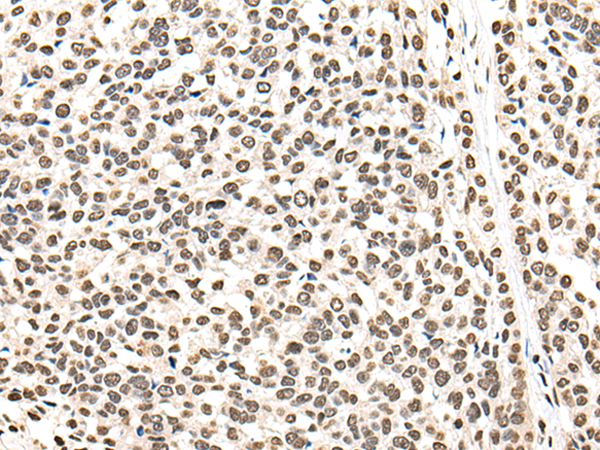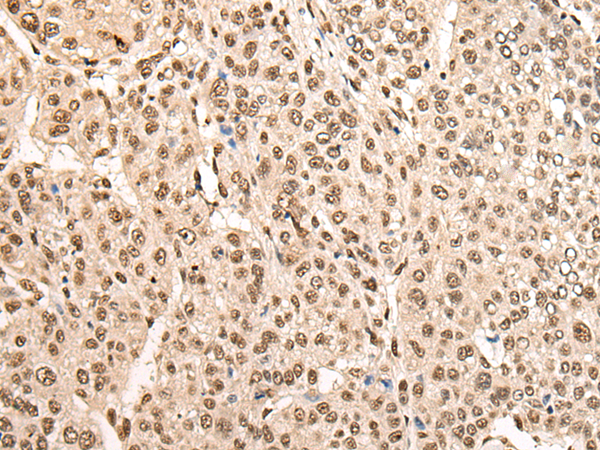

| WB | 咨询技术 | Human,Mouse,Rat |
| IF | 咨询技术 | Human,Mouse,Rat |
| IHC | 1/25-1/100 | Human,Mouse,Rat |
| ICC | 技术咨询 | Human,Mouse,Rat |
| FCM | 咨询技术 | Human,Mouse,Rat |
| Elisa | 1/5000-1/10000 | Human,Mouse,Rat |
| Aliases | BRF; CFDS; hBRF; BRF-1; GTF3B; TAF3C; TAF3B2; TF3B90; TAFIII90; TFIIIB90; HEL-S-76p |
| Host/Isotype | Rabbit IgG |
| Antibody Type | Primary antibody |
| Storage | Store at 4°C short term. Aliquot and store at -20°C long term. Avoid freeze/thaw cycles. |
| Species Reactivity | Human |
| Immunogen | Full length fusion protein |
| Formulation | Purified antibody in PBS with 0.05% sodium azide and 50% glycerol. |
+ +
以下是关于BRF1抗体的3篇示例文献(内容为模拟概括,仅供参考):
1. **文献名称**:*BRF1 phosphorylation regulates RNA polymerase III transcription under stress*
**作者**:Schramm L, Hernandez N
**摘要**:研究揭示了BRF1在应激条件下的磷酸化修饰如何影响RNA聚合酶III的转录活性,通过特异性抗体检测BRF1的磷酸化状态及亚细胞定位变化。
2. **文献名称**:*Overexpression of BRF1 in hepatocellular carcinoma promotes tumor growth*
**作者**:Marshall L, White RJ
**摘要**:利用BRF1抗体进行免疫组化分析,发现BRF1在肝癌组织中显著高表达,并通过调控tRNA合成促进肿瘤细胞增殖。
3. **文献名称**:*TFIIB-related factor BRF1 is essential for cell viability in yeast*
**作者**:Campbell FE, Setzer DR
**摘要**:通过BRF1抗体的Western blot和ChIP实验,证实BRF1在酵母中为RNA聚合酶III转录所必需,敲除后导致细胞生长停滞。
**提示**:实际文献需通过PubMed或Google Scholar检索关键词(如"BRF1 antibody" + "RNA Pol III")获取,并注意选择近年高引用的研究。
BRF1 (B-related factor 1), also known as TFIIB-related factor 1 or BRF2. is a transcription factor critical for RNA polymerase III (Pol III)-mediated transcription. It forms part of the TFIIIB complex, which binds to promoters of small non-coding RNAs, including tRNA, 5S rRNA, and other regulatory RNAs essential for cellular functions like translation and RNA processing. Structurally, BRF1 contains a TFIIB-like core domain and zinc ribbon motifs that facilitate interactions with Pol III and promoter DNA. Dysregulation of BRF1 has been implicated in cancers, neurodegenerative diseases, and viral infections due to its role in controlling cell growth and stress responses.
Antibodies targeting BRF1 are widely used to study its expression, localization, and molecular interactions in both normal and pathological contexts. They are applied in techniques such as Western blotting (WB), immunohistochemistry (IHC), immunofluorescence (IF), and chromatin immunoprecipitation (ChIP). Commercially available BRF1 antibodies are typically raised in hosts like rabbits or mice, with monoclonal and polyclonal variants offering different specificity profiles. Validation often includes knockout cell lines or siRNA-mediated silencing to confirm target recognition. Researchers also use these antibodies to explore BRF1's role in oncogenesis, particularly in cancers with elevated Pol III activity, and its potential as a therapeutic target. Quality control for BRF1 antibodies emphasizes minimal cross-reactivity with related proteins, such as BRF2 or TFIIB.
×